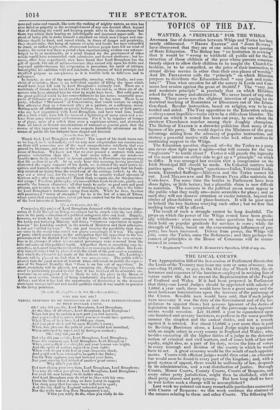TOPICS OF THE DAY.
WANTED, A " PRINCIPLE " FOR THE WHIGS. ANOTHER line of demarcation between Whigs and Tories has been nearly obliterated. "HENRY EXETER" and " Jonx Russtua," have discovered that they are of one mind on the vexed question of State Education. The Bishop has "no hesitation in avowing" that it would be 46 wrong to withhold all public aid for the in. struction of those children of the poor -whose parents conseien. tiously object to allow their children to be taught the Church Ca. techism' or to be compelled, as the price of their instruction, to attend divine service in other than their own places of worship." And Dr. Pnumporrs calls the " principle " on which Ministers purpose to distribute the Education-fund " very just and mode. rate!" Then what occasion for all the outcry in Lords and Com- mons last session against the grant of 80,0001.? The "very just and moderate principle " is precisely that on which Ministers asked for the money and obtained it. We never heard of any other terms. There never was the slightest intention of paying for the doctrinal teaching of Romanists or Dissenters out of the Educa- tion-fund. Secular instruction, based on religion, was to be ex- tended and aided. The Tory opposition to the Education scheme —always most impolitic—turns out to be a ridiculous blunder. The ground on which it rested has been cut away, by one whom the straitest Churchmen number among their doughty champions. The Bishop of EXETER IS a shrewder politician than many of the laymen of his party. He would deprive the Ministers of the great advantage arising from the advocacy of popular instruction, and destroy a powerful motive with those who lack other motives for continuing support to the Whigs. The Education question disposed of—for the Tories as a party can never show fight upon it again—what will remain for the two "regiments" to battle about ? Certes it will puzzle the ingenuity of the most astute on either side to get up a " principle" on which to differ. It was arranged last session that a compromise on the Irish Municipal Bill should be made. On Colonial matters both parties agree. On " Organic" questions—Ballot, Triennial Parlia- ments' Extended Suffrage—Ministers and the Tories cannot fish out. Lord MELBOURNE and Sir ROBERT PEEL alike maintain the Corn-laws. For some time the battles in Parliament have been sham fights, or little better; but a plausible sham is now difficult to maintain. The contests in the political arena must appear to the public what they really are—mere scrambles for place ; and as such they will not deserve attention or excite interest, beyond the circles of place-holders and place-hunters. It will be poor sport to behold the two factions worrying each other ; but we fear that nothing better will be offered. 'f he result of such a struggle cannot be long doubtful. The props on which the power of the Whigs rested have been gradu- ally withdrawn : even success on some questions has weakened their hold on popular gratitude for services to conic; while the strength of Tories, based on the ever-enduring influences of pro. party, has been increased. Driven from power, the Whigs will Join, some the Tories, some the Reformers ; and then perhaps the contest of principles in the House of Commons will be recom. menced in earnest.
* "Regiments "—ride Sir F. BURDETT'S Speeches, 1809 et seg. cm.


























 Previous page
Previous page